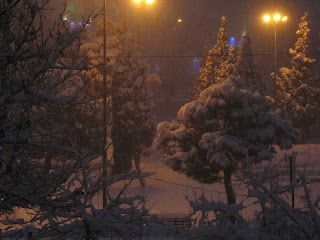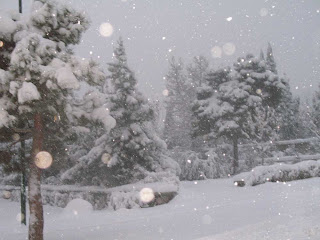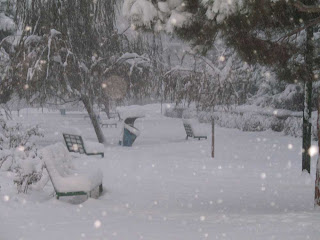صداهای سکوت
چهار رهرو تصمیم می گیرند که در سکوت،بدون این که حرف بزنند برای دو هفته به مدیتیشن بپردازند. در شبانگاه روز یکم شمع شروع به کم نور شدن می کند و سپس خاموش می شود. اولین رهرو می گوید:" اوه ، نه! شمع خاموش شد.".
دومین رهرو می گوید "فرض کنید حرف نزدیم؟"
سومی می گوید:"چرا شما دو نفر باید سکوت را بشکنید؟"
چهارمی می گوید:"ها ! تنها کسی که حرف نزد من بودم."
Sounds of Silence
 Four monks decided to meditate silently without speaking for two weeks. By nightfall on the first day, the candle began to flicker and then went out. The first monk said, "Oh, no! The candle is out." The second monk said, "Aren't we not suppose to talk?" The third monk said, "Why must you two break the silence?" The fourth monk laughed and said, "Ha! I'm the only one who didn't speak."
Four monks decided to meditate silently without speaking for two weeks. By nightfall on the first day, the candle began to flicker and then went out. The first monk said, "Oh, no! The candle is out." The second monk said, "Aren't we not suppose to talk?" The third monk said, "Why must you two break the silence?" The fourth monk laughed and said, "Ha! I'm the only one who didn't speak."
People's reactions to this story:
"Each monk broke the silence for a different reason, each of which is a common stumbling block to meditation. The first monk became distraced by one element of the world (the candle) and so lost sight of the rest. The second monk was more worried about rules than the meditation itself. The third monk let his anger at the first two rule him. And the final monk was lost in his ego."
The path is open to its failures as they are the stones to its success.
"I am reminded of a car game I used to play with my children called 'Listening for Silence.' The object of the game for me was to stop the noise in the car. The object of the game for the children was to see who could resist speaking the longest by listening for silence. If the first child spoke and the second child automatically burst out proclaiming victory, then both children lost. The object was to listen for silence and silence speaks for itself"
Things do not always go as planned.
This is symbolic of something else, I know, but I'll just say it the way it was told. If you're used to talking, it's going to be hard to resist the temptation to talk, moreso when you're with others, which I would think they would've thought of. It's like telling someone who sees just fine to close their eyes for a week, staying awake, and not open them at all, no matter what noises they heard. It's pretty near impossible to resist temptation when you've never had to resist that type of temptation before.
You could have ended the story at the point when "the candle flickered and went out."
The four monks have each broken their silence for an altogether different reason. But another side is in the fact that the 4th monk spoke at all. Had he simply maintained his silence, he would've been successful in his endeavor. But if he had, in all likelihood, the other three would've probably continued to argue and not even noticed his silence. I know many people who are like the 4th monk; their motto: If I'm doing something good and no one is watching (or no one notices), I might as well not be doing it at all. They believe that the reward is not in the effort, but in the recognition.
Were I a fifth monk I would wait 10 minutes into the exercise, stand up and yell loudly. HAAAAAAH I LOSE!!!! Then walk out to do some non-competitive meditation.
Enter a woods and hear the wilderness listen. That's where you'll find it.... John, your "Ph.D." is not silent.
This story reminds me a teaching. When you meditate in breathing, you should concentrate your mind to your breath only and cast out all thoughts, including a thought that you are breathing.
"If you can describe the zen then you do not know it. 'The buffalo left his enclosure for the abyss, his head passed the doorway, his shoulders, girth and haunches, yet his tail would not pass through' - - koan from the gateless gate"
"Oaths and Promises - Lightly spoken..Hardly Kept."
It is the provence of knowledge to speak; it is the privilege of wisdom - to listen.
It is clear from reading the story that none of the monks are spiritually ready to perform the difficult silent meditation. Unfocused and easily distracted by their surroundings(the burnt out candle and the conversations of themselves) they all failed to reach their aim of meditating in silent for two weeks. I see the moral of the story is 'to plan thoroughly and be solidly ready before embarking on an action. Focus your mind constantly in reaching your aim, and the objective will be reached, no matter how hard it is.'
فقط دو کلمه

در یک معبد ی بسیار سخت گیر بودد. پیرو یک پیمان سکوت،هیچ کس به هیچ وجه اجازه ی حرف زدن نداشت . اما یک استثنا در این قانون وجود داشت . هر ده سال یک بار رهروان اجازه ی حرف زدن فقط دو کلمه را داشتند. پس از گذشتن نخستین ده سال سکوت در معبد ، یک رهرو نزد رهرو بالاتر خودش رفت و رهروی بالاتر گفت: "ده سالی گذشت خواسته ی تو در دو کلمه چیست؟"
رهرو گفت: " رختخواب .. سفت...."
رهرو ی بالاتر گفت: " صحیح ،"
ده سال بعد، رهرو به دفتر کار رهرو بالاتر رفت و رهروی بالاتر گفت: "بیش از ده سالی گذشت خواسته ی تو در دو کلمه چیست؟"
رهرو پاسخ داد:" غذا...بوی گند می دهد...."
رهروی بالاتر پاسخ داد: "صحیح،"
ده سال دیگر هم گذشت و رهرو بار دیگر نزدرهرو بالاتر رفت که پرسید: " پس از گذشتن این ده سال دو کلمه ای که می خواهی بگویی چیست؟"
رهرو گفت:" من ... ول کردم "
رهروی بالاتر پاسخ داد: " من می دانم چرا. شما همیشه شاکی بودی."
There once was a monastery that was very strict. Following a vow of silence, no one was allowed to speak at all. But there was one exception to this rule. Every ten years, the monks were permitted to speak just two words. After spending his first ten years at the monastery, one monk went to the head monk. "It has been ten years," said the head monk. "What are the two words you would like to speak?"
"Bed... hard..." said the monk.
"I see," replied the head monk.
Ten years later, the monk returned to the head monk's office. "It has been ten more years," said the head monk. "What are the two words you would like to speak?"
"Food... stinks..." said the monk.
"I see," replied the head monk.
Yet another ten years passed and the monk once again met with the head monk who asked, "What are your two words now, after these ten years?"
"I... quit!" said the monk.
"Well, I can see why," replied the head monk. "All you ever do is complain."

"Bed... hard..." said the monk.
"I see," replied the head monk.
Ten years later, the monk returned to the head monk's office. "It has been ten more years," said the head monk. "What are the two words you would like to speak?"
"Food... stinks..." said the monk.
"I see," replied the head monk.
Yet another ten years passed and the monk once again met with the head monk who asked, "What are your two words now, after these ten years?"
"I... quit!" said the monk.
"Well, I can see why," replied the head monk. "All you ever do is complain."
بیداری
Enlightened
 One day the Master announced that a young monk had reached an advanced state of enlightment. The news caused some stir. Some of the monks went to see the young monk. "We heard you are enlightened. Is that true?" they asked.
One day the Master announced that a young monk had reached an advanced state of enlightment. The news caused some stir. Some of the monks went to see the young monk. "We heard you are enlightened. Is that true?" they asked.
"It is," he replied.
"And how do you feel?"
"As miserable as ever," said the monk.
People's reactions to this story:
"The master was either lying or decieved, and the student was at the least lying to himself. As a wise man once said, 'Enlightened people take things lightly.'"
"To be enlightened doesn't mean to be lucky simultaneously.We all know why."
"Once achieving enlightenment the monk could see the state of the world and life with clarity. What he sees is not good. It is ironic that this wonderful achievement only brings him misery through the enlightened truth he now sees."
"It doesn't matter if your enlightened or not, you still have the same feelings as before. Only now things are much clearer. "
"Reality is reality whether you're enlightened or not."
"Knowledge is infinite. The more you learn, the more you will realise that you know nothing."
"Enlightenment changes nothing and everything. Nothing is solved! Enlightenment is not a goal but a state of being that has to be rediscovered on a continual basis."
"o.k. smile."
"The reason I believe this being to say "miserable as ever" is because now the others will be expecting him to be a certain being and act in certain ways. One cannot be free if there are always expectations of him."
"the more you know, the less you know."
"After "enlightenment" the young monk finally understands the world, how it works, and all of its component parts. Now this feat is a large one, one that many do not achieve. The reason the monk is now more miserable is because he feels the situation that he now is "enlightened" upon is a helpless one. Unfortunately the monk is pessimistic, and cannot forsee a solution for all of the problems that he has just begun to understand. Maybe the monk is not truly enlightened."
"the journey is more important than the destination."
"Enlightenment is a state of consciousness beyond emotions, positive or negative. An enlightened person would be totally accepting of his state of mind at each moment, however miserable that might be. Ultimately however true enlightened would in time lead to a wholly positive emotional state which would reflect and express the bliss of transcendence."
"If enlightenment is the state of seeing things as they truly are, then it isn't necessarily going to make you happy...."
"We have no valid way of predicting how we shall feel once enlightenment is attained - although we all have presumptions and curiosity. The reality may (probably will?) be wonderful yet different from our assumptions."
"When a person is enlightened, they discover that they still know so much less, than ever they did."
"For monks to became enlightened doesn't require to change feelings."
"I think that the young monk told his peers that he was as miserable as ever so that they would not envy him or his enlightenment. If they were to envy him then it would hinder their own development because in order to reach this higher consciousness one is supposed to have let go of any desires. To want this enlightenment so much would just add on another 'want'".
"Many people believe that with enlightenment comes peace, power and a sense of knowing, but with each stage of enlightenment we must still chop wood and carry water."
"I used to be different, now I'm the same..."
یک روز برفی را توصیف کنید!
 شش ونیم صبح
شش ونیم صبح

خوب حالا پرنده ها و گربه ها از کجا غذا بیارن؟
